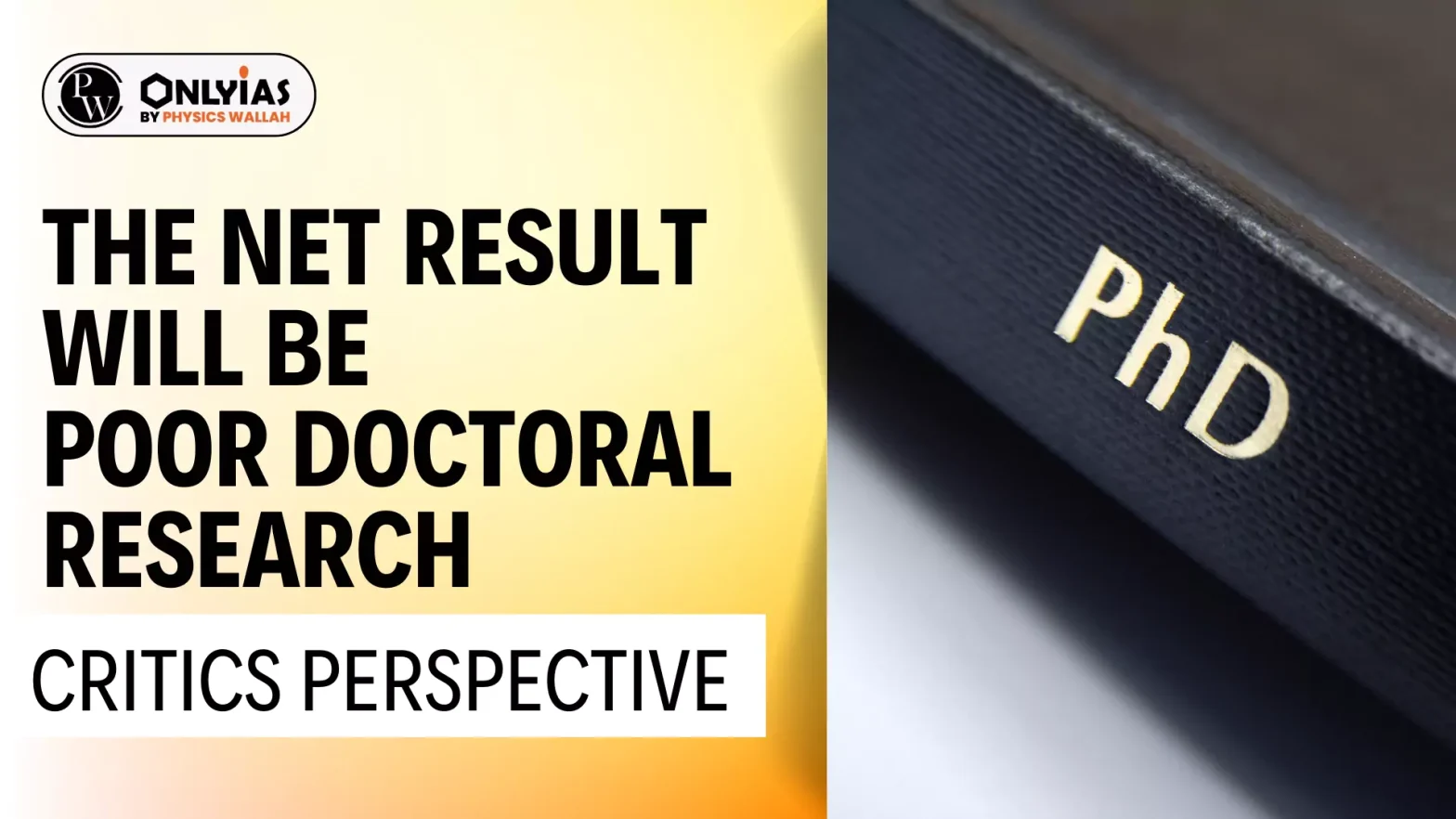The use of the National Eligibility Test (NET) as a primary criterion for PhD admissions in India has sparked significant debate within the academic community. Traditionally, the NET has served as a qualifying examination for Junior Research Fellowships (JRF) and for determining eligibility for assistant professorships. However, the UGC has introduced changes by making PhD admissions based on UGC NET scores starting from this session.
Critique of the UGC NET for PhD Admissions
- Nature of the Test: The UGC NET, which is entirely based on multiple-choice questions (MCQs), predominantly assesses lower-order cognitive abilities such as memory and recall. While this approach may be useful in certain contexts, it is inadequate for evaluating the critical thinking, deep analytical skills, and creativity essential for successful doctoral research.
- Limitations of the NET Format in Assessing PhD Preparedness: PhD research requires a profound engagement with complex ideas, the ability to critique existing knowledge, and the creativity to contribute original insights. Unfortunately, these vital skills are largely overlooked in the current format of the NET, which primarily demonstrates how well candidates can answer multiple-choice questions, rather than their preparedness for PhD-level work.
- For instance, in a history subject, the NET may ask when the 1857 revolt occurred and who participated, but for PhD admission, students should be expected to possess a deeper understanding of the subject.
- The test should assess whether candidates can analyse the reasons behind historical events and their implications, which is not achievable through the current NET format.
- Trivialization of Complex Subjects in Humanities and Social Sciences: In disciplines such as literature, social sciences, and the humanities—where interpretation and analysis are critical—the emphasis on factual recall through MCQs trivialises the intricate subject matter.
- For example, asking candidates to identify specific details from literary texts or historical events, such as “What was Premchand’s first book or story?” does little to measure their ability to engage with broader theoretical concepts or develop nuanced arguments.
- A more effective approach for PhD admission would be to require candidates to analyse how Premchand depicted society in his stories, thereby assessing their aptitude for doctoral-level research.
Enroll now for UPSC Online Course
- Disadvantages for Marginalised Communities: The reliance on NET scores as the primary criterion for PhD admissions has pronounced negative consequences for students from marginalised communities. These students often face significant barriers in accessing the resources necessary to adequately prepare for competitive examinations.
- Impact of Coaching Inequality on PhD Access: The growing necessity for coaching to succeed in such exams exacerbates this inequality, as the high costs associated with these coaching programs can be prohibitive.
- Exclusion of Talented Individuals from Marginalised Backgrounds: Consequently, many talented individuals from marginalised backgrounds may find themselves excluded from pursuing PhD programs—not due to a lack of intellectual capability but because systemic barriers remain unaddressed by the current admissions process. This leads to a waste of talent, reduced diversity in PhD programs, and ultimately affects the quality of research produced.
- Impact on Institutional Autonomy: Furthermore, the centralization of PhD admissions through the NET presents a significant threat to the autonomy of higher educational institutions. Historically, universities have played a critical role in selecting candidates based on unique criteria, such as research proposals, interviews, and discipline-specific tests.
- For example, the introduction of standardised testing, as seen with the Common University Entrance Test (CUET) for undergraduate admissions, has already begun to erode institutional autonomy.
- Risks of Centralization on Academic Innovation and Diversity: The new directive further entrenches this centralising approach, diminishing the ability of universities to shape their research programs and faculty recruitment processes.
- Critics argue that such centralization risks leading to the homogenization of academic standards, stifling the innovation and diversity that are essential to scholarly research.
- Collectively, these factors undermine academic freedom and threaten the integrity of higher education in India.
- Brain Drain: As India aspires to become a global leader in education and research, the increasing trend of students opting to pursue PhDs abroad raises significant concerns.
- Factors Contributing to Brain Drain in Indian Academia: The exodus of bright minds to foreign institutions can be attributed to various factors, including more holistic admission processes that prioritise diverse qualifications and experiences.
- In contrast, India’s system has become increasingly centralised and rigid following the NET compulsion, potentially contributing to greater brain drain.
- Decreasing Diversity: Moreover, the growing reliance on NET scores as the primary criterion for PhD admissions could inadvertently narrow the scope of research in India. Research thrives on diversity—of thought, methodology, and perspective.
- The Need for a Flexible and Inclusive PhD Admission Approach: By funnelling all PhD aspirants through a standardised test that emphasises rote memorization over critical thinking, we risk cultivating a generation of scholars more adept at passing examinations than at pushing the boundaries of knowledge.
- This narrowing of academic inquiry threatens to stifle the development of original ideas and innovative research, which are essential for progress in any field of study. To foster authentic scholarship and meaningful contributions, a more inclusive and flexible approach to PhD admissions is necessary, one that values diversity and encourages original thought.
Check Out UPSC Modules From PW Store
Conclusion
Research is essential for a nation’s progress and development. Relying solely on NET scores for PhD admissions is inadequate for ensuring India’s global academic standing. To promote high-quality research, India must adopt a more holistic admissions approach that prioritises creativity, critical thinking, and the ability to engage with complex academic inquiries. Recognizing the uniqueness of each student and valuing diverse perspectives is crucial for cultivating scholars capable of driving innovation and excellence. By doing so, India can aspire to become a global leader in education and research.
![]() 3 Oct 2024
3 Oct 2024
